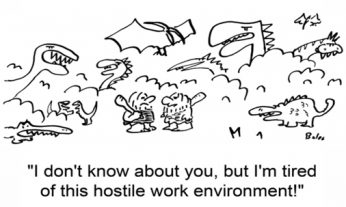 Let us say that, as you prepare to exit a job, your employer approaches you and asks that you sign a separation agreement before your final departure. Perhaps they have some concerns about the knowledge you have accumulated over time. Maybe you are leaving under unpleasant circumstances, and they fear that you will spread rumors about them, or even file a lawsuit against them. Should you sign the document they have presented to you? A local employment attorney can help you make the right decision for your unique circumstances.
Let us say that, as you prepare to exit a job, your employer approaches you and asks that you sign a separation agreement before your final departure. Perhaps they have some concerns about the knowledge you have accumulated over time. Maybe you are leaving under unpleasant circumstances, and they fear that you will spread rumors about them, or even file a lawsuit against them. Should you sign the document they have presented to you? A local employment attorney can help you make the right decision for your unique circumstances.
Terms of a Separation Agreement
California law does not require a separation agreement, so when your employer proffers one, chances are it has something of value for both parties that is not required by law. Generally speaking, employers are looking for company secrets to be locked down and may wish to protect themselves from future lawsuits. What might they offer in exchange? The terms of the agreement might include the following:
- A severance package, which may include wages and/or benefits in a lump sum, for a defined period of time, or in some combination of these;
- A written plan regarding how and when payouts will occur;
- Education benefits;
- Tax and insurance benefits;
- A non-compete clause that limits your opportunities in the field for a specified period of time;
- A non-disparagement clause, barring you from saying negative things about the company or your reasons for leaving;
- A statement agreeing that there was no coercion involved;
- Clauses related to what will happen to company property that is in your possession, potential for rehire, or other matters of concern.
Unlawful Separation Agreement Requests
While it may be reasonable for an employer to attempt to protect itself from future legal action, California law states that employers can not request that you waive your claim to legal action regarding certain areas, including:
- Minimum Wage;
- Workers’ Compensation;
- Unemployment insurance;
- Overtime.
You Have Leverage Over Signing a Separation Agreement
When considering whether or not you want to sign a separation agreement, you need to remember that you do have some leverage here. Clearly, the company is hoping to gain something. Knowing this, do not be afraid to negotiate to get the things that you want. If they are offering a one-month severance package, try pushing it to six weeks. If you really need health insurance, or you would like to keep the company car you have been driving for the past five years, ask; you may get more than you ever imagined. Presumably they are asking you to give up legal rights. What is it worth to them? [Read more…]









